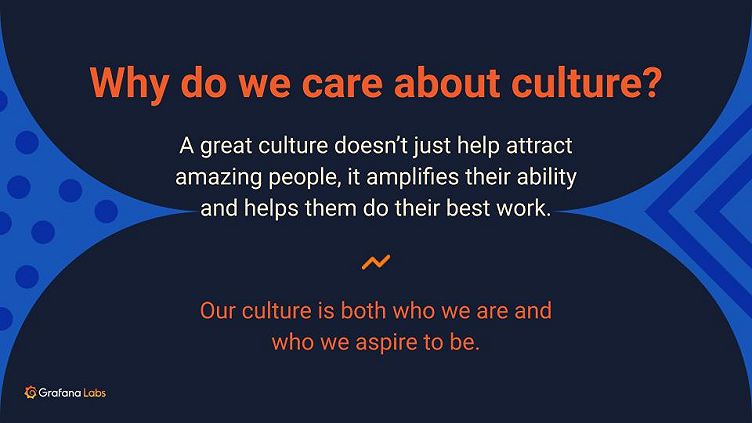
The 7 cultural values that drive Grafana Labs
At Grafana Labs, we believe that our culture is one of the differentiators that make us an extraordinary company. In the middle of a pandemic, we’ve been in the very fortunate position to be in a high-growth phase: We’ve expanded the team by 118% this year, and our headcount just tipped over 250 global Grafanistas. Throughout all of this internal change and external turmoil, our founders Raj, Torkel, and Anthony continue to be driven by their commitment to build a culture that’s really special and to make sure our whole team can thrive within it.

Of course, doing that while we haven’t actually met any of our 2020 new hires due to travel bans has been a challenge! As a remote-first team, we may be pros at distributed working, but we’ve also always traveled a lot, especially to meet new team members during onboarding. We’re really feeling the lack of face-to-face connection at the moment.
So over the summer, we spent a long time talking to the team and gathering feedback on our culture and what makes Grafana Labs special. We’ve taken all of that input and updated our deck on our cultural values. While we recognize that culture isn’t what you write down in a deck, the process was useful nonetheless. This new document reflects both who we have always been as well as where we want to go as we approach our next phase of growth in 2021. We’re really excited to share them with you, through the perspectives of members of our team.
1. Share openly and default to transparency

“The first one is a big one for us. This is something that we currently live by, and it’s really important to us that we continue to do this. And the reality is that it’s challenging to do this as we scale. This is manifested in many things in Grafana Labs, the open access to information, open access to meetings in general, and even the way we share our revenue numbers with the whole community at every GrafanaCon. We place a high degree of trust in the whole company, and we share almost everything. We really want to continue sharing openly and transparently as a key tenet of how we operate.” — Raj Dutt, Co-founder and CEO
2. Respectfully empowered
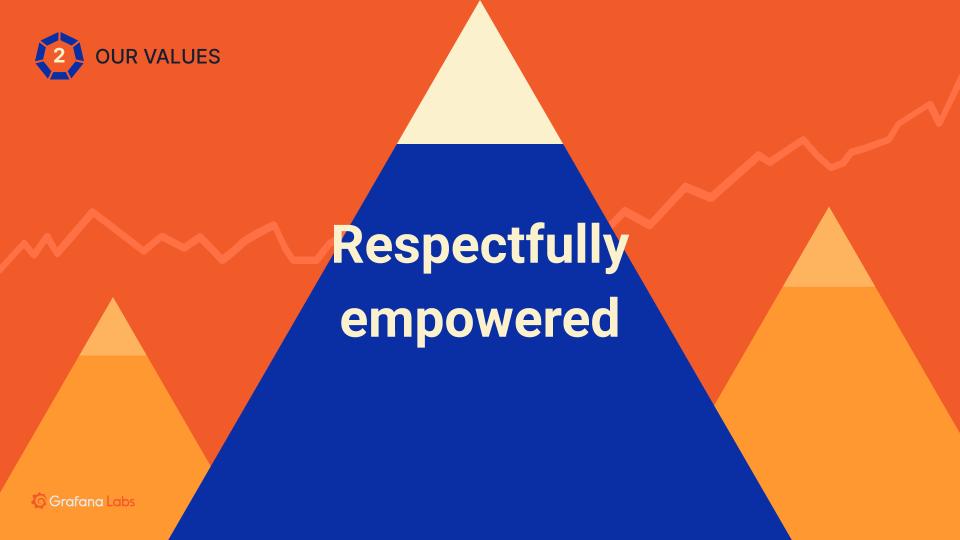
“In reflecting on this, it took me back to GrafanaCon EU 2018, which was our first international event. There was a poster that we released on stage called ‘innovate everywhere.’ The entire company fit on one stage at that point, we were 40-some-odd people, and at the end we took a bow. I realize now in retrospect that ‘respectfully empowered’ is a much better way to say what ‘innovate everywhere’ was trying to say. ‘Respectfully empowered,’ to me, is this idea of autonomy as an individual and the trust and the expectations we have for each other, that when we’re working on anything, small or big, that we understand that it’s not just what we’re doing, but it’s also the contribution to the company as a whole. It’s raising your hand if something doesn’t feel right. It’s doing a little bit more when you know that it can help solve a problem in a different way. I saw that in the folks that joined in the year after I became the first full-time employee at the end of 2014, and that felt so great. What feels even better is that I still feel this with 200 people and counting.” — Matt Toback, VP, Customer Experience
3. OSS is in our DNA
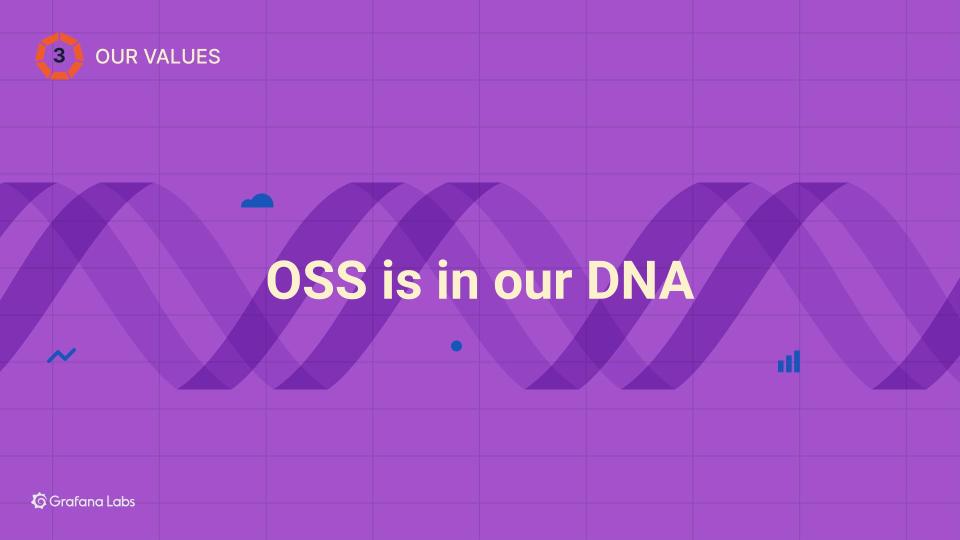
“I love open source. I love to see how Grafana improves the world. I love to see how SpaceX uses Grafana to launch rockets. I love to see how people use Grafana to monitor bee hives. I love that Wikimedia can use Grafana to monitor their servers to deliver Wikipedia. But that’s not the goal of this company. To be honest, the goal of this company is to sell software, and to be a company that does great. By building open source projects, we create a community and users that other companies cannot. We focus on adoption first because that’s where we create these communities and our users. Eventually, however, we also need to focus on the commercial aspect, because we cannot continue this journey of creating great open source software unless we also create great commercial interest for the company.” — Carl Bergquist, Principal Software Engineer
4. High Say/Do ratio
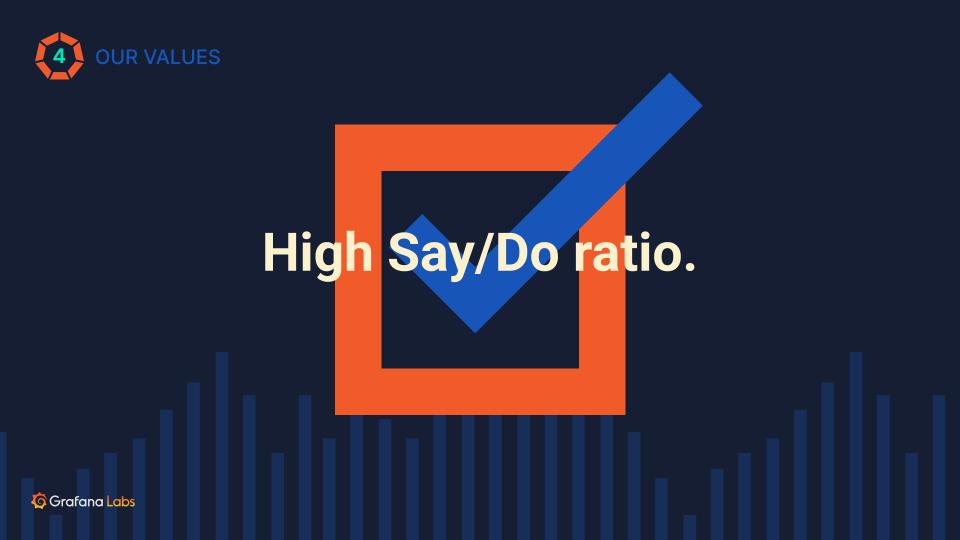
“It’s pretty straightforward: We follow through on what we say we’re going to do. And this applies not only to each other, for us as colleagues, but also for our customers and our users. It comes down to trust and the ability to work together seamlessly. It’s also what allows ‘Respectfully empowered’ to scale. If you have 100% confidence that if I say I’m going to do something, I’ll follow through on it, and you don’t have to chase me down or worry if I am going to drop the ball, and then you multiply that times the 230 or so people that work at Grafana Labs, that makes us work together that much easier and more efficiently. To implement that in practice, we have to be personally accountable for delivering on our commitments. And if we take our commitments so seriously, we need to make sure that what leads to making those commitments is also taken seriously. ‘Disagree and commit’ is another thing that I believe in pretty strongly, and related to that is ‘no silent disagreement.’ We’re a company that can have respectful debate and discussion, and we want to hear from people regardless of title or function. We want people to convince others with data and reason, not just because it’s the CEO saying it. Then once we do decide, we need to move on and do what we can to support it.” — Douglas Hanna, COO
5. Seek diverse perspectives
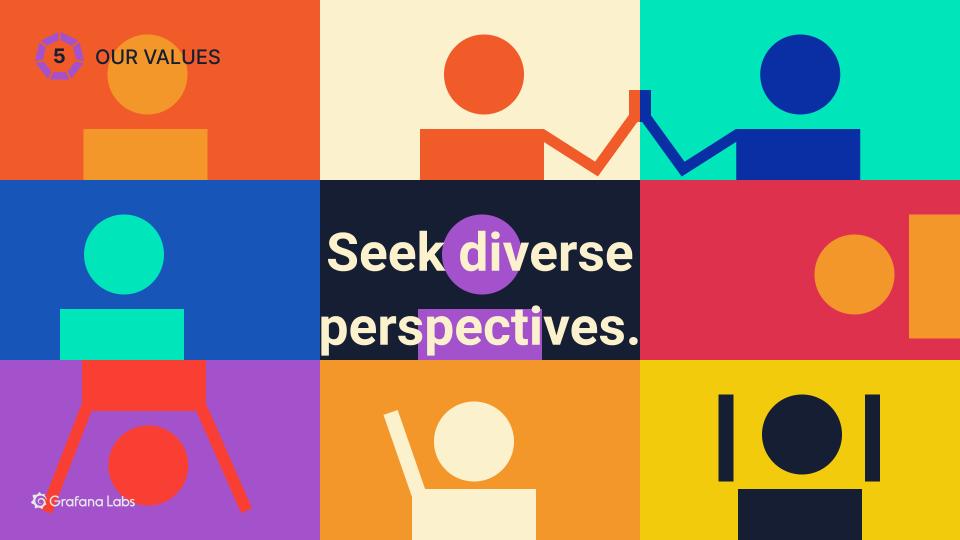
“So often I’ve experienced diversity being no more than just a nice phrase; when it came to action or just standing by the employees coming from underrepresented and underappreciated groups, nothing happened. When I joined Grafana Labs almost a year and a half ago, our team was very different and way less diverse than it is today. Which, to be honest, was a concern of mine. However, all the conversations I had and people I met during the interview process made me realize that even though the team wasn’t diverse at the time, I knew I would feel safe and welcomed and could truly be myself here. Looking back at a year ago, it’s amazing how much has changed and how much effort we’re putting into making Grafana Labs a safe environment where we can all feel valued, appreciated, and free to be who we are at work. Seeing Employee Resource Groups coming alive, training, sometimes hard conversations, improvements to our recruitment process to make it less biased, but also all the support I personally got when going through some tough times, is just heart-warming. Don’t get me wrong, we still have a long way to go, but it’s amazing to see how our team has changed and how much effort is happening to make sure we not only recognize and respect differences, but also amplify everyone’s voice, remove barriers, and appreciate each other for our unique backgrounds.” — Diana Sarlinska, UX Manager
6. Progress over perfection
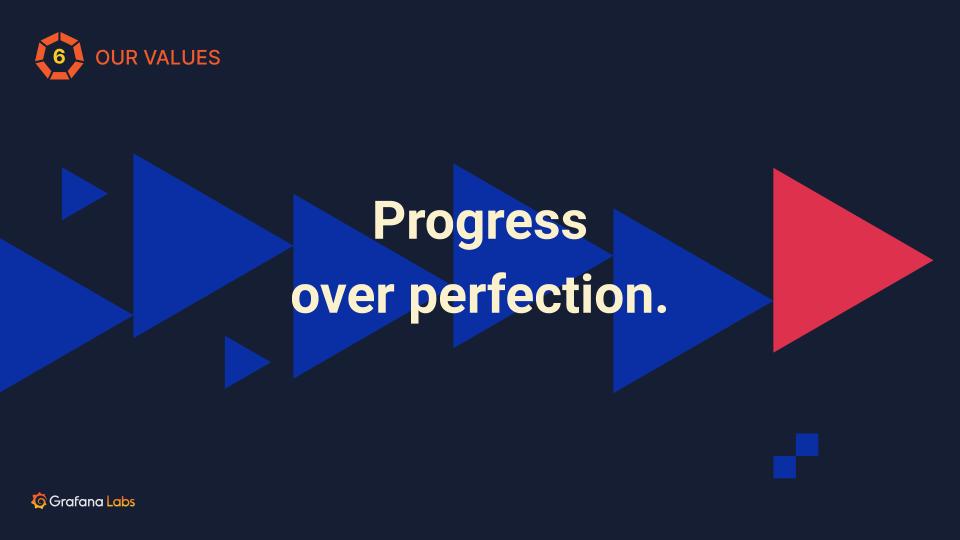
“I’d say progress over perfection is probably one of the key values that allows us to keep delivering in this phase of growth. Look at the offsite channels that we had recently, the career ladders, the interview processes are probably only iteration #4 or 5 or 6. They might suit us now, and when they don’t, then we sort of tweak them. We’re fully embracing this iterative process, which comes from engineering. If you look at the history here, we launched three open source projects that were all, I think anyone could say, objectively successful, but would anyone say perfect? Definitely not, but they definitely brought value to users. And I think that’s the really important bit here. Grafana was a better UI for Graphite. Loki was a simpler logging solution than anything that was out there. If you look at Tempo, which we just released, there’s already real user feedback from people wanting to use this, because we’re solving real problems. If we are solving users’ problems and things are ready to ship, then we ship them, and then we’re ready to learn from the users.” — David Kaltschmidt, Director of UX
7. Help each other thrive
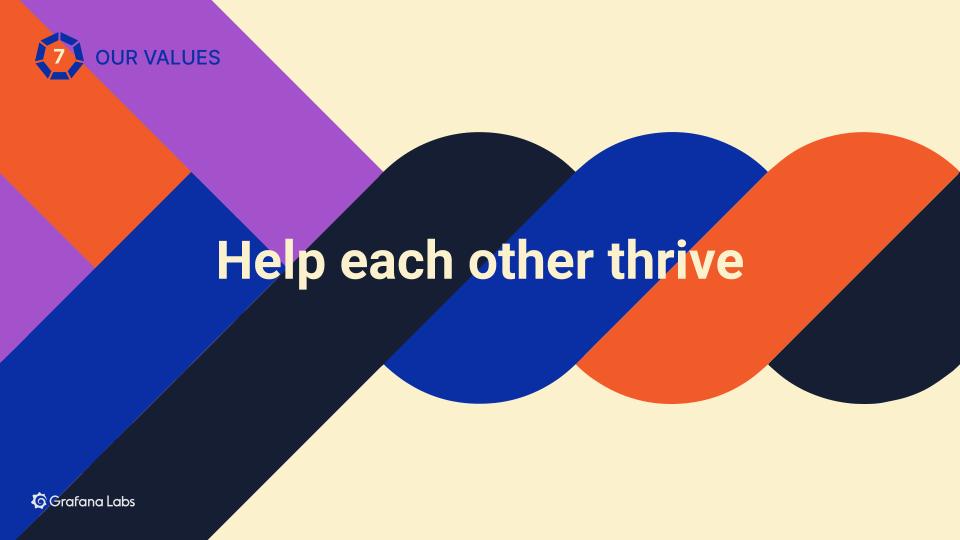
This value is one that really resonates with me.
I spend a lot of my time talking to our team and participating in our interview process with prospective Grafanistas. I get asked a lot why I decided to join Grafana Labs. My answer is that I almost didn’t. At the time I wasn’t looking for a new job. My second son was three months old, and I felt quite strongly that taking on a new job at a startup might not be the best move. The more I talked to Raj, Torkel, Anthony, and the team, though, the more excited I got about the opportunity.
Two things really stuck out to me: The first was that the team knew that they wanted to scale the company, and they really cared about doing it in a thoughtful and careful way, i.e., to build our culture for the long term. My second impression was that the team were all just so kind and friendly. Those two statements remain true for me more than two years later. We go out of our way to support and help our colleagues, users, and customers. Being a distributed team means that collaboration and helping each other be successful need to sit right at our core. This year it’s been more important than ever. We win together, as one global team.
It’s relatively easy to write admirable values; it’s much harder to live by them and bring them to life in a rapidly growing and changing team. Culture is a continuous aspirational project for us, and we’re excited to keep working hard to make sure we can hold on to our core values and evolve the edges as we look ahead to our next stage of growth in 2021.
Finally, just in case it wasn’t obvious, we’re hiring. Check out opportunities here.
